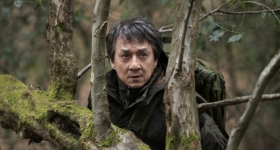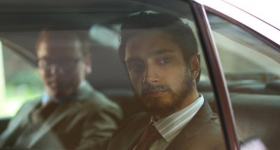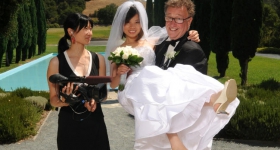CAMBODIAN American filmmaker Socheata Poeuv's debut documentary film, New Year Baby, wowed audiences and won the Jury Prize at the 2007 San Francisco International Asian American Film Festival. I saw the film right before I left for a five-month Buddhist pilgrimage across Asia and, in a way, it served as an emotional starting point for my own voyage.
The film bridges the personal and the historic, as a moving account of her family's struggle and trauma during the genocidal reign of Pol Pot, as well as her own voyage of discovery back to Cambodia. She is, of course, the New Year baby of the film's title.
Socheata means "good birth," and Socheata was a good birth indeed for her family-she was born on the Cambodian New Year in a refugee camp in Thailand, after her parents survived the nightmare of the Pol Pot's killing fields.
Socheata is derived from the Sanskrit Sujata, and Sujata was an important woman in Buddhism-she was the village maiden who offered a nearly dead Siddhartha sweetened milk porridge after his six years of fasting and extreme asceticism. This was the turning point for him: that night, as the legend goes, he overcame Mara (a demon of temptation or delusion) and attained enlightenment. So, it was fitting that I carried the filmmaker's story with me as I traced the path of Buddhism from India to Japan. Of course, her story resonated most powerfully as I traveled in Cambodia. As I walked through the genocidal museum in Phnom Penh and the temples of Angkor, walking the same ground she walked in her film-my experience was informed and deepened by hers.
Now, a year later, I sit down with Poeuv, who is on a visit to the San Francisco Bay Area, to look back at her own journey and where it has taken her.
Poeuv emigrated with her family from that Thai refugee camp to the decidedly different suburbs of Dallas in 1982 when she was just 2. Sometimes, she felt almost embarrassed to be Cambodian.
"Cambodians are at the bottom rung of the Asian scale. We're darker skinned, have a lower level of education and lower income levels," she says. "Then we had this terrible history where our own people killed a quarter of our own population."
Not that she knew much of that history. "Everything pre-1982 was a black hole. I knew more about the Holocaust than I knew about the Khmer Rouge."
Needless to say, Dallas at the time was hardly an epicenter of Asian American identity, despite the fact that her mom knew every Cambodian family in Texas. Poeuv dreamed more of Bonny England than Balmy Cambodia.
"I was a big Anglophile! I was into English literature (she ended up majoring in English at Smith College), and I loved Merchant Ivory films. BBC's Pride and Prejudice came out when I was 16. I thought I was Elizabeth Bennet. I even had an outfit! It was this velveteen dress with a high waist."
While Cambodian history was a black hole, Cambodia itself was little more than a backward jungle to her. But that would all change on Christmas Day 2002, when her mother gathered the whole family around her four-poster bed and roughly laid out the true story of their difficult passage.
"My normal nuclear family was far from it-it was actually made up of a patchwork quilt of survivors," Poeuv says. Her two oldest sisters were actually her cousins, children of her mom's sister who died in the killing fields. Her older brother was really her half-brother, the only son of her mother's first marriage. Her mother's first husband was also a victim of the Khmer Rouge, along with another daughter. She was the only biological offspring of her parents, whose mismatched marriage remained a mystery to her. Poeuv felt many emotions, from shock to even feeling a little betrayed that her parents hadn't trusted her with this information before. Immediately, she wanted to go back to Cambodia "to understand everything."
She joined her parents for that first trip back to Cambodia in 2003, armed with good camera gear. Despite working at ABC and NBC News, she thought she would just be shooting a "glorified home video." But when she got back, she realized she had the makings of a movie. She returned to Cambodia for another monthlong trip with her parents the next year, this time with funding and an itinerary that would take her to the significant places of her family's adversity and exodus.
She hoped that those places would "trigger their memories, and it would all make a lot more sense to me." Many of those places had been scrubbed clean-bamboo huts and thatched roofs long gone-emblematic of a history that had been erased. But even so, the places held some kind of power. Once they got to the site of a former labor camp, "my father's memories came back, and we started talking. There was something still there. An aura."
This was especially strong at the site of her aunt's burial, next to a latrine. Her parents had long wanted to recover her remains and give them a proper burial, but they somehow felt that she was at peace and decided not to do so. Poeuv had wondered why her aunt had been buried next to a latrine, but visiting the site revealed the reason: the concrete hole was the only thing that survived the decades. Thirty years ago, her parents knew that the latrine would be the only marker they would recognize, should they survive.
Carrying the camera, while sometimes a barrier-for example, when meeting crying relatives who only want to touch and hold her-was mostly a boon. It gave her "courage and freedom" to do things she might not have otherwise done-for example, talking to a former Khmer Rouge official who was in charge of the labor camp where her parents suffered.
The camera also mediated the potentially overwhelming experience. Poeuv points to her need to shoot footage as she walked through the Toul Sleng Genocidal Museum in Phnomh Penh, once the infamous S-21 torture prison. I had a similar experience there. I was so overcome by the images and magnitude of slaughter that I started snapping pictures, a constant digital barrier between myself and a gruesome past. I paused only when a Cambodian man passed behind me and whispered, "Don't take pictures-you need to see," before he disappeared. As right as he was, the pictures I took are imprinted on my mind like no memory could be, indelible and enduring, much like New Year Baby preserves Poeuv's odyssey and honors the journey of her family.
The film has won numerous awards, and was selected to screen on PBS' Independent Lens during Asian Pacific American Heritage month this year. Most importantly, Poeuv's travels have changed her. She brought back "a love of the people, wanting to help them in some way."
She applied for and won a prestigious Echoing Green fellowship to bring a new dream to fruition. With it, she created an organization, Khmer Legacies (www.khmerlegacies.org), which facilitates videotaped interviews of Cambodian American parents by their children. The videotapes will go into an archive, which will be available as an educational tool. Stationed right now in the Bronx, NY, it will expand to other Cambodian American communities with the goal of finally going to Cambodia in five or six years.
"The interview experience itself bridges the generational divide and provides an opening to conversation and to healing. It's about changing the whole culture of these communities," she said. "The mentality after the Khmer Rouge is that nothing good comes out of speaking out-and it could be dangerous. To get the community to change that mindset is going to take a lot of work, a lot of time. It's going to take a critical mass of people getting involved for it to get legs and grow in a big way."
A poem I once read advised readers to travel. "Know the ticket counters like the lines in your hand," it said. Poeuv discovered this truth, as did I. The bottom line-travel moves you.
Ravi Chandra is a psychiatrist and writer in San Francisco.









Comments